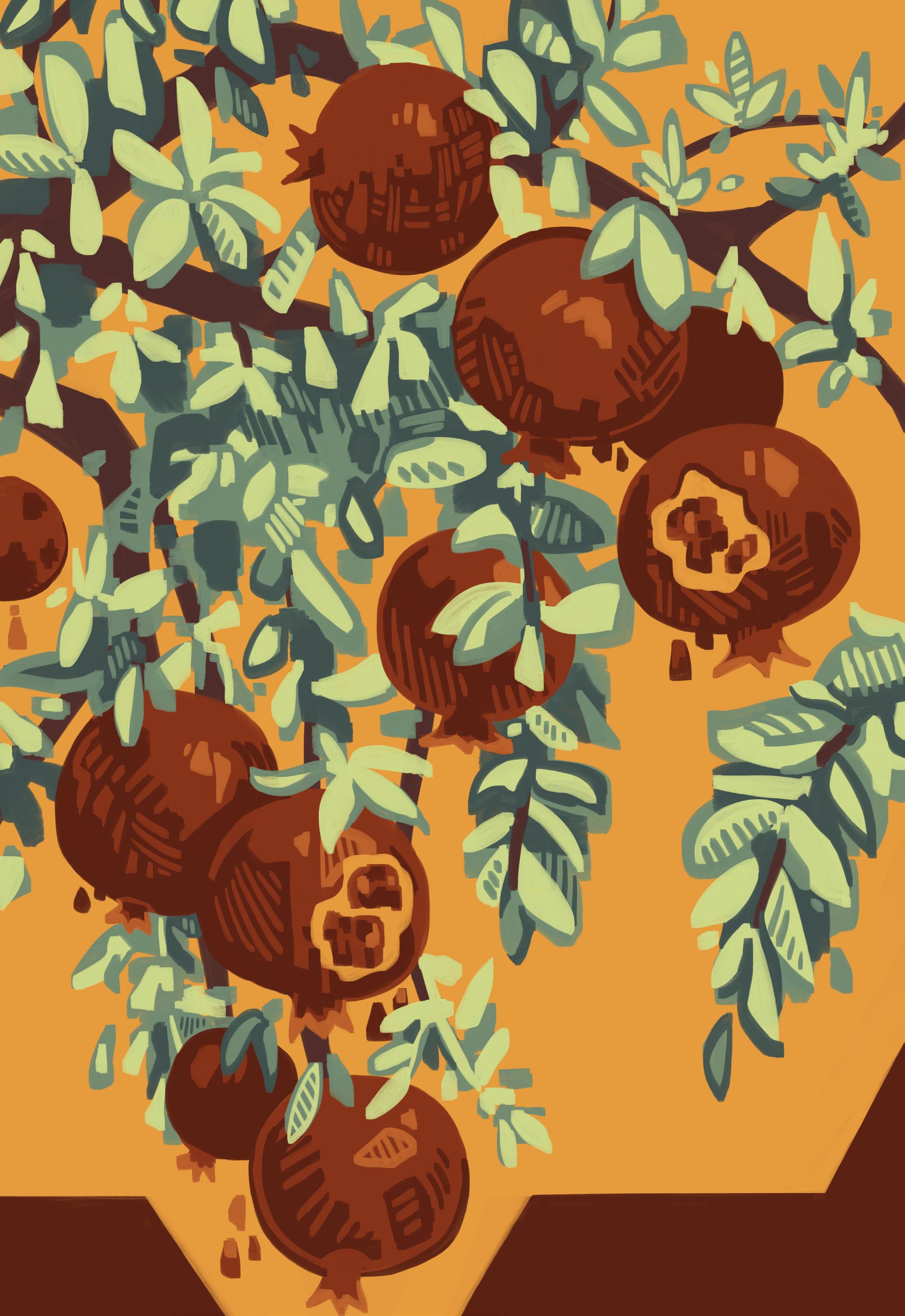DISASTER DISASTER





Our Fall Magazine, Fluidity, was a collection of questions, calmness, and tranquility, mixed with blue and purple hues. It conveyed a sense of being one with water and with the ebbs and flows of life. While our masthead took great pleasure in creating the magazine, we also stopped frequently in the face of adversity. Tension grew day by day. We looked around at one another in awe of this tension and thought: this is a disaster. And yet, we were having fun!
Thus, the Disaster Magazine was born! Messes, chaos, and evil (oh my!), mixed with laughter and spills that are quite comical and exhilarating when looked at from an opportunist’s lens, and we are undoubtedly grateful to each of our contributors for sharing this love of disasters and for helping us create this disaster of a publication.
Sprinkled throughout the pages of our Winter Magazine, you will find pieces from both familiar and new writers. With more poems, bright reds, and emotional explosions, prepare yourself for an unparalleled reading experience that will leave you literally dangling from the edge of your seat. The pages of this magazine cover topics that range from sex symbols, earthquakes, and junkyards, to self-induced cringe, hauntings, and panic at the passage of time. If you’re feeling too overwhelmed from all the chaos, we also bring you a poem from our Fluidity Magazine era to provide some relief in the midst of this mess.
Creating this disastrous magazine would not have been possible without the help of our Features Editor, Sam Rosati Martin, our Poetry Editor, Ishika Rishi, our Associate Features Editor, Eugene Kim, our Photo Editor, Kelsey Phung, and our Art Editor, Shelley Yao. We also want to extend a huge thank you to our Design team, Chloe Loung and Wendy Wan, who are responsible for the gorgeous (and not at all disastrous) design you’re looking at right now.
We hope the pages of the magazine help you view your disasters more empathetically, allow you to relish in the feeling of knowing everyone feels like a disaster sometimes, and put you at ease when you realize that we’re all just big hot messes in bundles of hay. Put your helmets on, we hear there’s a storm coming…
From our trainwreck to yours, Janna Abbas and Rion Levy
features associate: Eugene Kim copy associate: Maeve Ellis associate art editor: Chelsey Wang design associate: Wendy Wan associate photo editor: Nicholas Tam illustration team: Shelley Yao, Chelsey Wang, Raquel Lwein, Natalie Song, Jennifer Fong Li, Sahrada Mujumdar, Callie Silverton, Faith Dong
editorial assistants:
Romina Emtyazi, Sakura Armstrong design team: Chloe Loung, Wendy Wan, Janna Abbas, Rion Levy
visual team: Nicholas Tam, Kelsey Ngan Phung, Anh Minh La, Tra Pham
copy team: Rion Levy, Janna Abbas, Adam Lam, Sakura Armstrong, Max Lees, Kieran
editors-in-chief: Janna Abbas, Rion Levy production manager: Janus Kwong features editor: Sam Rosati Martin poetry editor: Ishika Rishi
senior copyeditor: Roensa Salija
art editor: Shelley Yao photo editor: Kelsey Ngan Phung design editor: Chloe Loung
America's Sex Symbol is a Tortured Woman
Kalliopé Anvar McCall
A Ripple Through Life
Sakura Armstrong
Complex
Kelsey Ngan Phung
Petersburg
Gillian Chapman
Junkyard Circus
Max Lees
The Novena of Tio Mauro
Michael Mejia
Consequence
Ben Murphy
Halfheartedness
Kelsey Ngan Phung
It's Okay to Believe in Ghosts
Eugene Kim
Crashing
Romina Emtyazi
This is Not a Place of Honour
Kieran Guimond
To Find Myself
Kelsey Ngan Phung
Supersingle Blackout!
Anya Shen
Party Post-Mortem
Brooke Collins
The End of Time
Chelsea Wang
Pyrrhus Retires From War
Namah Jaggi
All Into One
Ella Spitzer-Stephan
The End.
Rachel Sugin
Seasick
Sydney Pacheco
There's a Baby Within the Beast
Kalliopé Anvar McCall

words by Kalliopé Anvar McCall
words by Kalliopé Anvar McCallillustration by Shelley Yao
illustration by Shelley Yao
To 'cure' me after my psychotic break, my cousin Drew gave the keys to his L.A. luxury fucking condo so I could get some R & R, his words, not mine.

When I picked up the keys from the balding caretaker, he leaned in before handing them to me and whispered, She lives above you, in a way that said, I masturbate to Google images of her in that Victoria's Secret lingerie set.
I've been here for a month. I have more juice on Her than People magazine could ever dream of. I have mapped out the shape of her penthouse apartment by her delicate footsteps echoing through my ceiling. I know the sound of her alcohol addiction: the cellar door creaks. I hear the occasional scream and I know that blonde-angel-rehab-Barbie or whatever She calls him has her bent over the kitchen island, tugging at her ponytail that is wrapped around his wrist.
But for America's sex symbol, She doesn't fuck him that often.
Tonight, She's out among Hollywood glitterati in a black plunging gown that says I have eyes and ears on everything, and I know I'll be woken when She returns from the Vanity Fair after-party at five am, so drunk She's making Drew's 12-carat chandelier tinkle, so depressed I hear her wail to Alanis Morrissette while removing her makeup.
I read in Glamour UK that She has contamination OCD, which checks out by the trail of maids that travel to and from her apartment and the constant hum of the Hoover. They photoshop the blood off her knuckles but they can't fool me. I hear the pipes gush as She scrubs her hands for the seventh time.
America's sex symbol is a tortured woman.
That makes two of us. I've put my bed just under hers. When she pours herself a G & T, so do I.
When she moans with her magic wand down her jeans, I pull out mine and join her.

words by sakura armstrong
illustration by callie silverton
The windows were going to pop out of the car’s frame. The shaking caused them to swell in and out with each quake as if the vehicle were breathing, hyperventilating, to the point where the strain on the glass was almost visible. Leaves hailed down and one particularly large branch crashed into the middle of the street, pulling my eyes away from the car. My mother clenched my hand.
It's going to stop soon.
Then we were silent. The earth continued to purge, groaning after each hard shiver of the ground until it too was silent. As if they were the toys that come to life in stories, the trees, cars, and earth stopped as immediately as they started, in fear of getting caught moving. The hand holding mine started pulling and I looked up.
C’mon, before the aftershocks start.
Yanked around the corner, up the street, and into the house. We started searching for details, for anything out of place. I heard laughter and turned to see my mother pointing at a lamp. It had fallen perfectly inside a trash can filled with tissues and paper, carefully preserving the stained glass lampshade without a single crack. She then grabbed the remote off the coffee table and turned on the news while taking me to the stairwell and seating me on the first step, far away from any windows or furniture.
Don’t move, I have to check upstairs.
I started to cry, begging her to not go but she told me she had to and headed up the steps. Footage of the earthquake played on the television: buildings swaying, trees crashing, office cubicles collapsing. Then the screen changed. Bright red characters I couldn’t read and a newscaster frantically speaking in a tone I’d never heard come from one. The frame switched to live footage from a camera facing a street. An alarm blared from every street lamp as water swept away houses, cars, people.
Thudding from behind me, my mother emerged with her phone glued to her ear. Dialling, re-dialling, calling over and over to try and reach my father, brother, grandmother, anyone.

She paused for a second seeing the screen.
Don’t worry, we’re okay. That’s in Tohoku.
She sat down next to me and hugged me with one arm, continuing to dial with the other, all while staring at the television. Her eyes unblinking, holding an expression I couldn’t quite read.
I’d gotten a diary that day. Pink and sparkly with a fairy on the cover. Sitting with my mother at the dining room table, I started to write, determined to have perfect penmanship; the day’s events were nearly forgotten in my mind. My father had just managed to get home after being caught in hours of traffic with everyone trying to leave their offices while the subways were still shut down.
What should we do, Phil?
I don’t know. We could go to my parents?
All the way overseas? I’m not sure I want to go there.
I mean, what else can we do? We don’t know how bad the radiation is. We need to go somewhere fur ther, at least. We should leave tonight then, before traffic gets even worse in the morning.

Yeah, we should. We can decide about my parents after we get further down south.
Okay. Sakura?
I looked up.
Can you go pick out some of your clothes and put them in your backpack? We’re going on a trip.
Okay!
The backseat of the car smelled like new leather. Sitting between my mother and brother with my father and the real estate agent taking up the front, I marvelled at the trees outside. I’d never seen this much nature before in Tokyo, and now this was our new home. It’s so green! I can’t believe it’s so green here! My mother also stared outside, except she was silent. When I turned to face her, she still didn't say anything, aloofly squeezing my hand in response. The real estate agent laughed from the front seat. Yes, it is really green. Those are evergreen trees, that’s what the state is known for.
It had been ten years since I’d seen the velvet blue patterned school bus seats but they were exactly as I’d remembered. I sat in the row second from the back, setting my coat down against the seat to use as a pillow.
Hey!
I looked up and a boy was standing over my seat. Hi.
You used to go here right?
Yeah, I did. It’s been a long time though.
Y’know I’m pretty sure we used to ride the same bus. He dropped his things down in the row behind mine and kept talking through the gap between the seats. For the first time in a while since being back in Japan, I was at ease. Something felt familiar, the conversation flowed easily, like I was back with an old friend. And even though I’d barely known it, I was. 8

We paused in front of the Family Mart convenience store. The sun was just starting to set so the employees lit up the green and blue sign adorning the awning.
He remembers better than I do, because this was the bus he’d ridden for years after I’d left. I shook my phone, trying to figure out the direction to my old house, swivelling the device till I was pointed the right direction.
He took my hand in his and we crossed the street, up and down the hill and a turn to the left. I recognised this street. The trees still surrounded the pavement on either side, but the branches were thinner than I remembered. The old car was gone and the parking lot sat empty. Rounding the corner to where the house sits on the road that used to never be this narrow. White stucco walls and a big window faced us. The curtains were closed, so we couldn't see inside, but I still pointed out little details to him from what I remembered.
I leaned over, wrapping my arms around him and he looked down with a soft smile.
I’m glad you came back.
Me too.
written by
illustration by


here it comes— the edges of my frail mind falter and fade. dreadful closet walls, dirty and mangled, sick yellow paper, turn, twist, tighten, swallow whole.
through the dingy apartment esophagus i am thrown into the stomach of the street suffocating summer sweat like swirling bile.
in the sky, the sweltering sun sighs, settling down for sleep. oh, this world! a fever seeps inside me now, rustling the detritus buried in the murk of my skull, the scum that i am. fitful and convulsive machinery, spasmodic anatomy, land conquered by fear.
oh, sorry sight! napoleon on his knees, brought down to beg. watchful eyes glimmer along the streets, marbles shimmer in sunset light, piercing yellow orbs catlike and silent. ants, ants, ants! their words and whispers— criminal, knave, pariah!
the moon, all round and bright, sits plump in the black sea like a kopeck. nighttime air drinks me, drains and digests dregs of breath from convulsing lungs. here i lie, at the assail and besiege of fever-filled dreams, again in the mouth of the beast, awaiting the gnash of its teeth.


It begins with a silence beneath the tinted sky where only a word or two tumble out a slot in the door and risk being lost in the wind.
Deadbeats wander and pick through immature mountains of debris, old books and warped jeans piled on top of burnt pages of journals and graves for dogs.
The train makes its hundredth stop at the maze of mirrors, on a charted course going nowhere fast, so fast that the passengers are put to sleep and the conductor doesn’t notice
the tapping on the glass above and around—
The clowns cue the music, laughing through tear-shaped painted eyes.
The tapping forms clouds that start to rain, and the band gets louder and lights dart faster and fog consumes the faces, the train, the junk, the sky.

But nothing to fear inside colourful tents and sugar boats— Poets and acrobats perform their greatest, most wildest, totally improvised gravity-defying masochism tango against yellows and reds of their grand stage, flying so high they almost catch the scent of rain but plummet back down, followed by pink parades of pachyderms, mice and technicolour drums, piano keys and trumpet bands

blasting till their lungs give out while monkeys swing from end to end, no balance beams or high theatrics, just chaos, noise, and high showmen, shouting with their laughing gas, it’s almost gone!
come while you can!
the kids in the back laugh hysterically like it’s the funniest damn show they’ve ever seen (and it is), and place bets on when the storm pounding and pooling on the roof will finally—
Crash the party with thunder, then silence, then rain. Leaving only a child who sits and stares at the junkyard circus black box funhouse and a hole in the sky with a patch tacked on.


I've spent the last few months reflecting on everything that's happened to bring me to this point. It's been a bittersweet recollection. If you were in Toronto in the late autumn of 2020, you might recall that Ontario reopened businesses and workplaces for a short period of time before abruptly overturning the decision. It was a haphazard and confusing time that only placed the most vulnerable at risk. My uncle, Mauro, was infected with COVID. He passed shortly thereafter.
My parents arrived in Canada in the late 80s and early 90s as refugees from El Salvador, a small country lining the Pacific Ocean in Central America. They were fleeing a brutal civil war that lasted over a decade. The militarised government would conscript boys as young as 12 to fight the Guerilla. My father fled at that age, only to live undocumented in the United States for four years before coming to Toronto. This is where he met Mauro, a Salvadoran refugee that had defected from the military and sought asylum in Canada. The two quickly became friends and lived together from the ages of 21 to 27.
Mauro was beside my father on the day that I was born. For two men that lost everything, they became each other's family. Mauro was my uncle in every way but blood.
Following "La Matanza" of 1932, where tens of thousands of Indigenous lives were taken, El Salvador became a predominantly Catholic state. Our funeral practices mimic those of the church, which meant that my uncle's death was followed by nine days of mourning called the Novena. However, ancestral ties to the Nahuat Pipil nation always complicated that Christian connection for my father. As a result, our Novena saw nine days of reminiscence, grief, pain, anger, silence, and acceptance.
The first day was the hardest. Neither of us could find the right words to say. All my father said was, “Do you remember when we used to go camping with him up North?” We used to head up to Algonquin Park with a couple of other families for a day or two. We would drive up to Jane and Weston to pick up Tio Mauro along the way, usually getting to the campsite just in time for dinner. The smell of tortilla, meat, and fire would stick to your jackets and linger for days after. For me, that was the smell of community and peace.
The funeral should have been about community. A collective grief that we all shared, a burden ever so softened by the presence of loved ones who felt exactly what you felt.
Funerals during the height of the pandemic robbed us of that. My family was lucky enough to be invited to the in-person ceremony. Everyone else mourned from behind their computer screens. One of the last comforts offered to mourners before the casket is lowered into the ground is a rose. Each attendee is given a flower to place on the casket of the deceased. I could count less than a dozen flowers on Tio Mauro’s casket. One of the funerary home workers must have noticed how sparse they looked over the wood because he came to bring them together in the smallest bouquet I have ever seen.
At Salvadoran funerals, we have a guitarist strumming folk hymns of our people while others sing the lyrics. You reunite with the earth, carried by the voices of those fortunate enough to share part of this life with you. There were no singers that day. There was no guitar. Only the wails of a woman burying the love of her life asking, why, God, why?
I sat by the fire with my father, watching the flames dance around, letting the smell permeate my jacket, my shirt, and my skin. Hoping it would strike deep enough to clear the grief in my heart, but all I could feel in that moment was pain and sadness. We sat that way until the fire burned out, and the cold be
came too much to bear.
The next two days were about storytelling. My father has a way of bringing his world to life right in front of your eyes. He reached down from the side of his chair and grabbed a handful of snow. He watched it roll through his hands and drop back to the earth.
“Have I ever told you of the first winter your mother and I were together?” Tio Mauro lived with them at that point—more accurately, my mom had moved in with my father and Mauro. There was a restaurant bar around the corner of their apartment with live music, good drinks, and an ambiance that let you forget about the freezing weather outside. My parents and Mauro thought it would be fun to race back home. They took off, trudging through the snow with exaggerated steps. My parents won the race. Five minutes passed… ten minutes passed. No sign of Mauro. He walks in, covered in snow, and starts complaining that he fell into a snowbank and nobody came to save him. My dad asks, “What do you have behind your back?” Mauro laughs and throws a snowball at him that he brought from outside. It was surreal for me to hear my father tell this story—inexplicably, picturing him in his 20s seemed fake. But his laughter was real. It
was contagious.
The next few days followed a similar pattern of sitting by the fire, eating, and drinking. Every day was a mix of sharing stories and feeling a smile creep in, while shedding tears that never seemed to run dry.
On the sixth day, the weather was unbearable. The only time my father was tempted to take a bereavement day was to avoid the forty-minute drive downtown to work. We seriously reconsidered the commitment we had to these nine days of mourning. The Canadian cold and snow forgive no one, including the bereaved. My dad looked at me and pondered, “At least Mauro is wrapped up, not feeling the cold.” It was hard to tell if he was making a cruelly dark joke or if there was an earnestness to his comment. I guessed a bit of both. Despite the chill, we spoke until the embers glowed orange.
The ninth day holds a powerful place in my heart. I would like to say that acceptance of the situation found its way into my life within nine days. It would have been a perfect ending to recognize that I had superseded the tragedy of my uncle’s passing. Unfortunately, my sorrow was as prevalent as it was on the first day. It shifted between unbearable and numbing, as it did the day of his funeral.
That being said, he was alive as ever in each of the stories we told.
Any individual that has lived as a refugee exists in a dichotomous world oscillating between erasure and violence. The hardest part for me has been reconciling his death with the life that he lived. My uncle deserves to be remembered both for the violence he was forced to endure, but more for the beautiful life he carved out for himself in Toronto. I am honoured to have been able to share part of that experience.
Disaster is a point of fracturing in the lives of those involved. It felt like my life had been torn into two parts—one where I still held the innocence of hope and one where this global disaster had affected me on a deeply personal level. I lost a part of my life and family's history that I will never retrieve. And yet, as we pass three years since the Novena of Tio Mauro, I find myself accepting hope, despite the intimate awareness that nothing is promised. We may all find perseverance, and this is my journey to finding it for myself.
It is my sincere hope that others may find solace in what I have to say.
The

For me, that was the smell of community and peace.
smell of tortilla, meat, and fire would stick to your jackets and linger for days after.
by ben murphy illustration by raquel lewin
wordsThe haze is finally gone, Vanished with the bang of a gun And an upset stomach. It twirled and swirled its way through night till daybreak, When the crimson sun arrived again Raining hellfire down on this parasitic host.
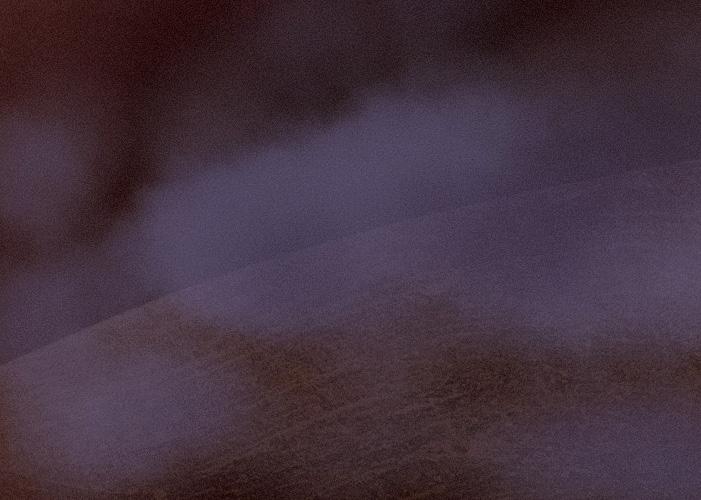

But it is gone. For now.
Until the pressure of the moment builds haziness Back into the eyes of the subject. Until the world decides that this man Needs more poison in his bloodstream.
Then it will return with a fiery vengeance; The wrath of the ten thousand grains of sand It took to make the bottle.


Yet that moment lies in the confines of tomorrow, Beyond the telling of the cards or the stars. It is not worth dwelling on the morning after. It is only worth sitting, Contemplating the steps it took to reach this destination.
But it’s a crisis of desire Without means to an end.
A silence that hurts. A stirring of unwelcome thoughts A window that calls to be opened, Yet is locked. Blocked by the haze, The fog that haunts His sorry soul.
Now it’s rising again. Like the ocean, Like the sun, Like the anxiety that grinds the gears in the man’s head until the window opens itself And he jumps, Screaming as he falls,
“I have found my purpo—”
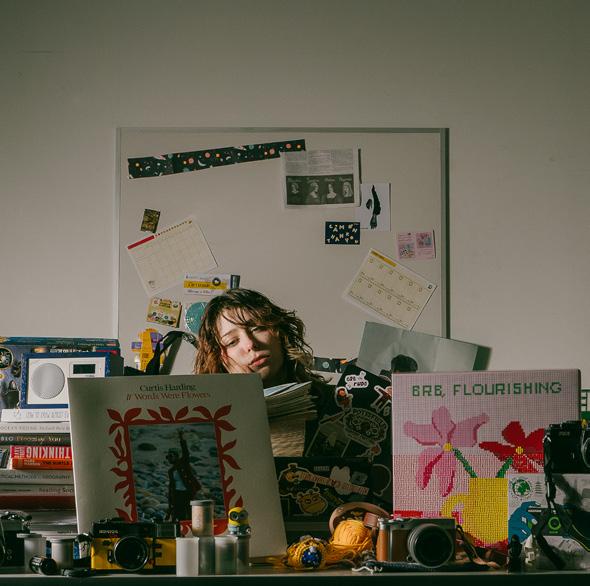
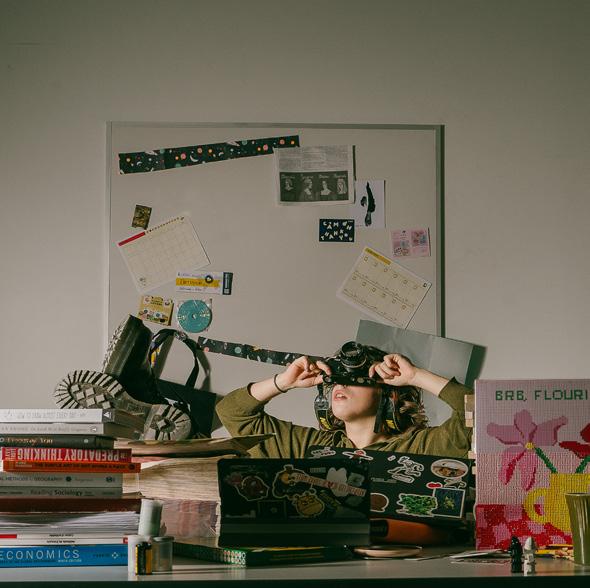
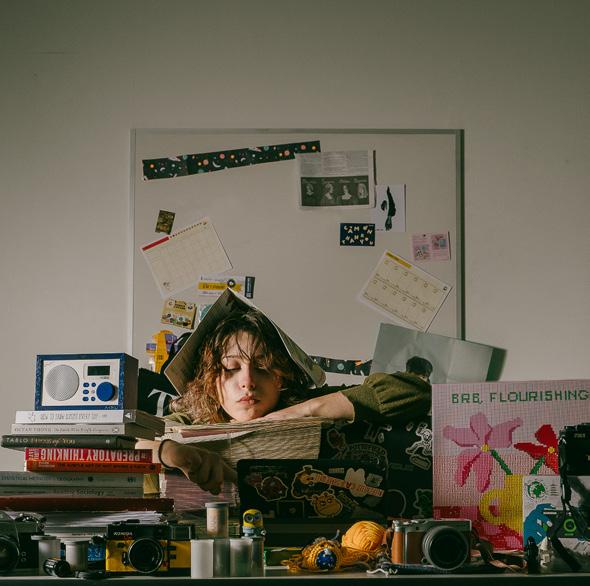

sometimes i feel like my life is going nowhere though i want to live fully satisfied i do not know how to go on properly it becomes a circle, a circle of the tornado that will tear the future apart
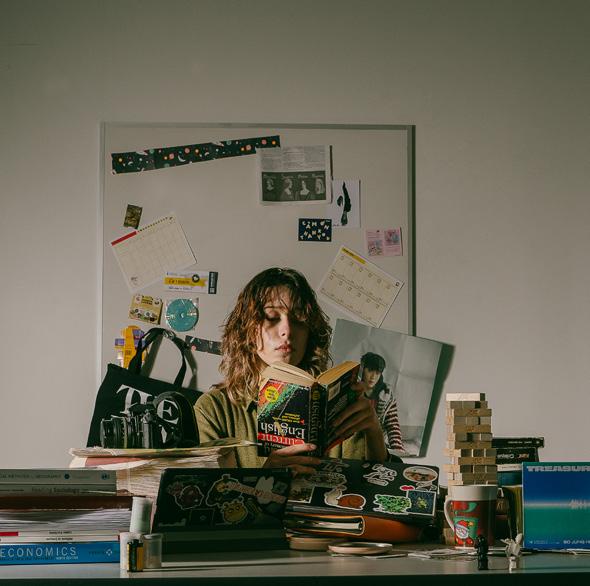

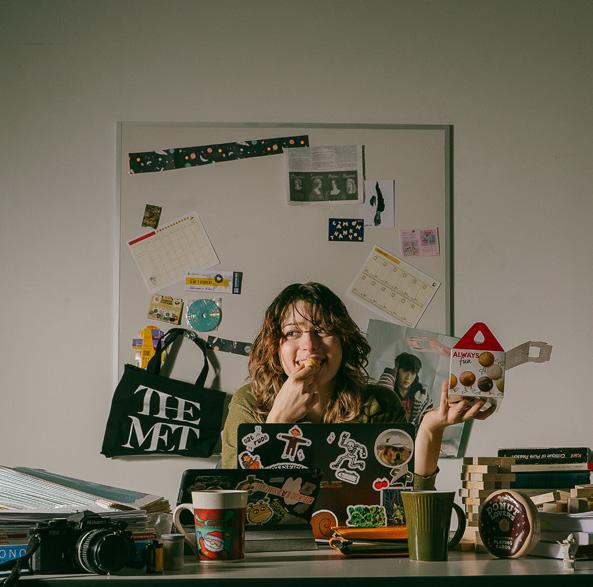

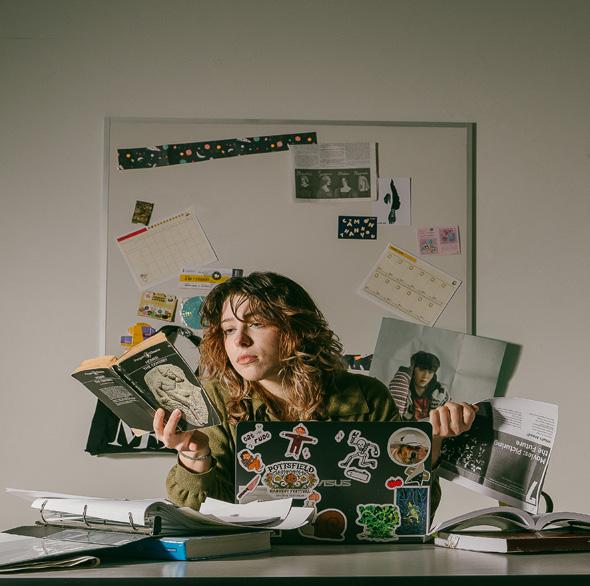
Model: Rchel Lewin
Words by Kelsey Ngan Phung
Visual team: Kelsey Ngan Phung, Nicholas Tam, Anh Minh Le, Tra Pham
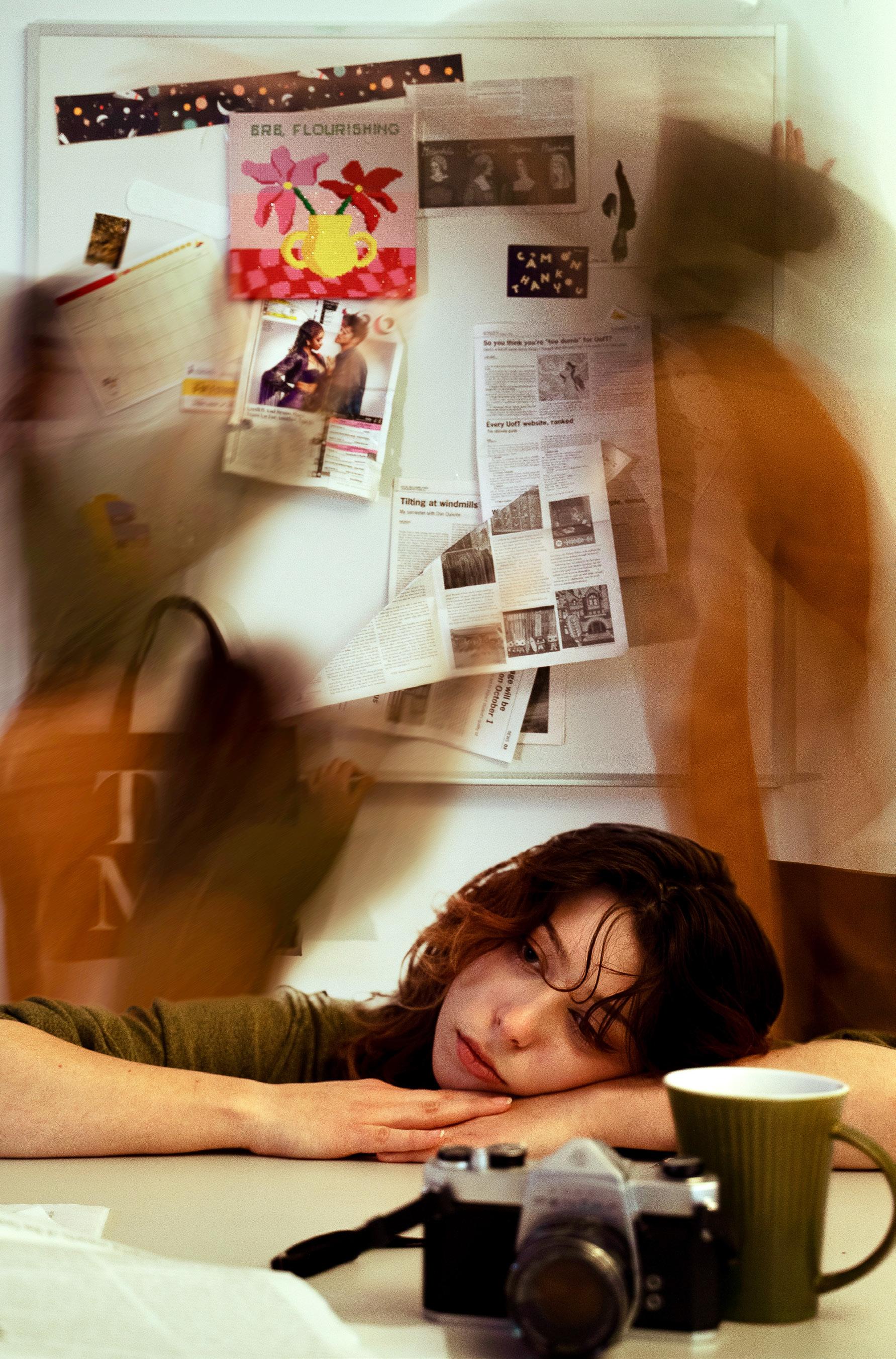
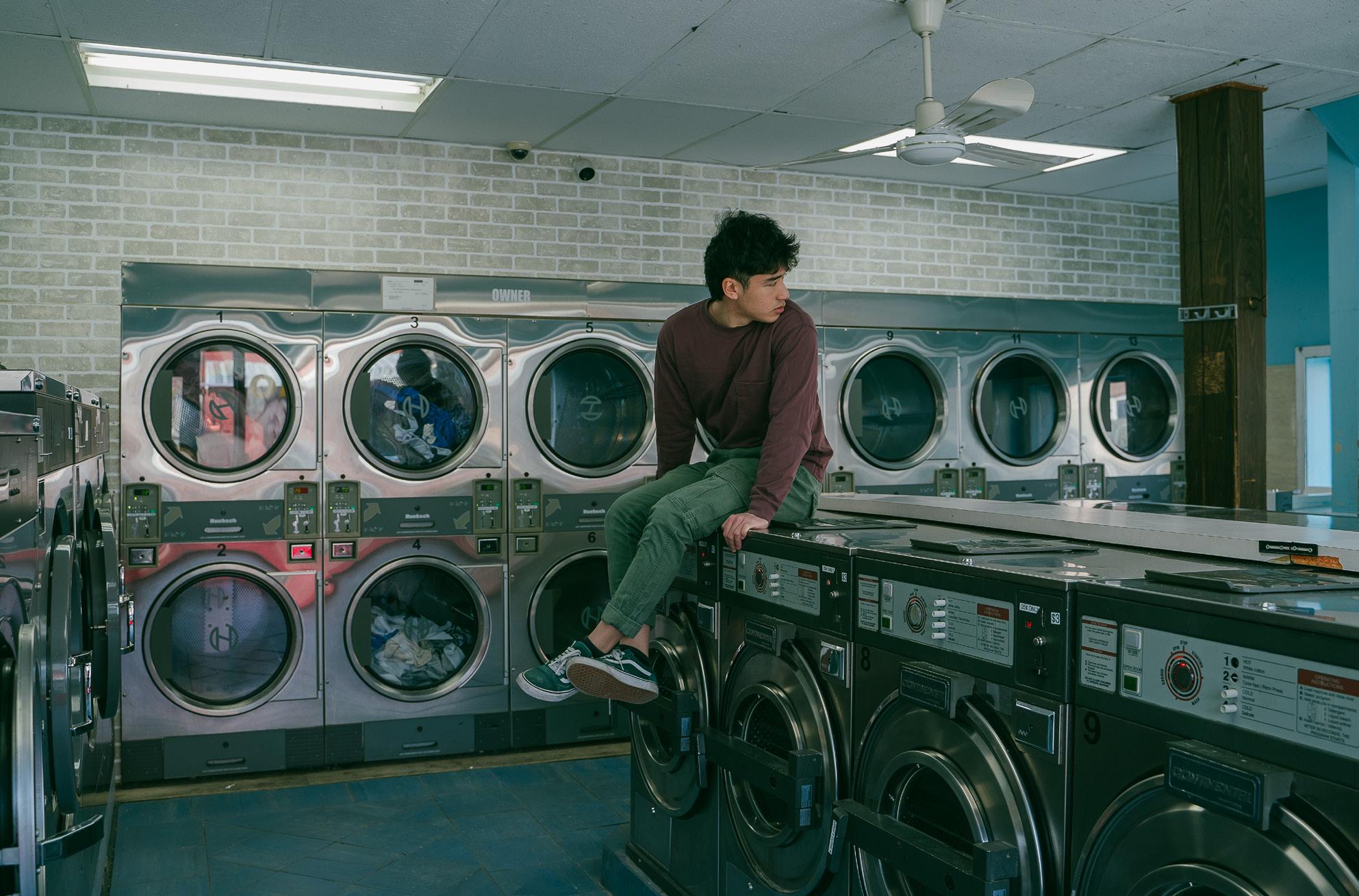
words by eugene kim photos by nicholas tam and kelsey ngan phung
“Whatever you now find weird, ugly, uncomfortable and nasty about a new medium will surely become its signature. CD distortion, the jitteriness of digital video, the crap sound of 8-bit - all of these will be cherished and emulated as soon as they can be avoided. It’s the sound of failure: so much modern art is the sound of things going out of control, of a medium pushing to its limits and breaking apart."
There’s a pigeon pecking away at what appears to be a spattering of puke. With two fingers I pinch the screen of my phone and snap a photo of the winged rat. A less disquieting version of Morrissey croons delicately in the background, an immortal plea for satisfaction. The timestamp on the liquid-crystal display slowly ticks away. Snaking out of the headphone jack is a dirt-cheap pair of earbuds, coiling and tangling as they slither into my ears.
The portable CD player, a CD-Walkman D-E220, cost me 25 dollars and 15 minutes of browsing Kijiji. It has a thick, yellowing label on the bottom with faded letters spelling out ‘REFURBISHED.’ I bought it off an old man named Eddy, who still uses Hotmail, at a subway station, where he sat in his green Honda Civic just off the curb at the side of the half-empty parking lot. Of course, there are liabilities to purchasing items from strangers, and even more so to meeting up with them in public, but I wasn’t particularly concerned about either risk. I just needed to feel that glossy plastic shell and the weight of its mechanical organs nestled within my palms.
In that psychical lull situated between the puke-eating pigeon and 1984 Morrissey, I began to ponder the circumstances which brought upon the insatiable hunger in which I desired more than anything the distorted notes stored within the pits and lands of a compact disc. Consumerism, nostalgia, individualism, I considered all of these possibilities. They all made sense, perfectly plausible realities, no matter how shameful. Admittedly, in my shame, I was desperate for an explanation that didn’t sound so plaintive.
a relic from ‘better days.’
Perhaps a compact disc can be seen as some paltry idol for the nebbish and disaffected to worship as a relic from ‘better days.’
One typically does not choose to listen to CDs in this day and age for their sound quality. Instead, one chooses to listen to CDs in this day and age due to their sound inferiority. Though the merits of a CD have been rendered obsolete, its shortcomings resurrect it. The very idea—the existence—of sound quality has moved on, reborn.
Distortion, skips, scratches, all these concerns have been deleted from the realm of auricular entertainment. Now files are uploaded to the cloud; Spotify is nearly ubiquitous for ‘listening to music.’ This evolution is what makes the CD so valuable; its being is now far more precious than its utility.
How ridiculous it is! An object with a clearly defined function is now loved for what it is over what it does; what it is bolstered by what was. What was, not what the CD was: the CD is a symbol that supersedes physicality. The body of a disc, shiny reflective aluminium laid over a slice of polycarbonate, is only a host that is temporarily home to something far greater. In it lies the past, and with it, the haunting wail of a future yet to come.
We consider the existence of the past to be just that: left behind as we trudge forward, one present to the next. Every existence produces a remainder, however, and the 16-bit sound of Johnny Marr’s guitar is exactly that. Only within the whirring machinations of a CD player can one come close to recreating an experience of the 1980s, those limitations of the technology adding a sheen of authenticity. Inevitably, then, the conditions for idealisation arise—the birth of a ghost. Overshadowed by its successors, it is forgotten, unable to tip the scales in the direction of the present.
The ghost of our past, one we collectively reminisce upon, begins to say things like things were better back then and our generation is so doomed—childish yearnings for irreplicable times. It trails behind us and we try to cling to it, but our arms do not reach. Mirrored in the shadow of these lamentations is the ghost that has imagined a future for us. Now with a name, the future is bestowed existence. At once it becomes both finite and infinite. Infinite in its scope looming across the periphery of human thought, finite once it is pencilled out into our future-present, demarcating the end of our current history as we know it.
Yet this future-present has failed to occur. Where is the better world we have hoped to conjure? Every day is another nail in the coffin of the present-present hellscape, not a far cry from that of the past-present. We feel a little abandoned, left to ripen and rot under the red-hot sun of now. We can’t help but think, is this it? Are we stuck here, in the amber of the moment, forever doomed to shift our understanding of the present to adjust for its metamorphic nature, no future in sight? Is this really it?
Oh, how we long to leap into the cool embrace of the future, glimmering with cyborgs and teleportation and knowledge surpassing the limits of our imagination. And it is with this longing that we turn to the past, haunted by what was to come but never did. We are at the end of the history that we’ve come to know, and we seek solace within the ghosts of the past.

Those merely a decade or two before us would scoff at our eschatology—the end of history has already occurred! The millennium bug, hell, even December 21, 2012, everything we are dreading was supposed to happen long ago. “We are late to being late,” and this phrase would have been what our predecessors heard, delayed in their realisation of an undeniable transformation of the world during the twentieth century. But now is not the time to mull over historicity.
It is a time to believe in the ghost, that hatchling of a future struggling to crack the shell with the milky egg tooth. Or is it really the ghost of the past, a resurgence of what was once thought long gone? It is impossible to distinguish. Regardless, so long as the timestamp on the liquid-crystal display continues to tick away, the CD deep within its stomach spinning out a tune, whatever you chalk up to being a true end has not arrived yet.
Conjecture what you will about being and time, but the bird is there, and so is the wind slicing your face, the ache in your feet, the sting of the sun. And for now, that’s all you need to move on to the next.
Whenever someone asks me to think about the personal meaning of a word, I immediately assume that I need to come up with some remote, allusive, or metaphorical definition. But when it comes to disaster, the only idea that comes to my mind is its most redundant and conventional meaning. It involves physical pain, blazing objects flying around, and mainly, an utter loss of control.
exhausted from school that I decided to go to my sister’s place for the night rather than stay at my dorm. I was on the subway and going through snapschats that friends had sent me. I glossed over hers without batting an eye: a video of her with friends in a car, laughing and singing along to music—merely moments before disaster.
I don’t remember much of that day. I recall being so

About three years before that, I had designated a specific
day to say goodbye to her; we met at a coffee shop around noon and ended up strolling in the street until seven o’clock. On that day, I assured her that I was going to come back in less than a year, and I was optimistic that perhaps at some point, she would come to Toronto, and I could show her around the city. But after moving to Canada, I hadn’t been able to visit home. As disappointing as the situation was, it wasn’t a huge bother to me. I knew that there would be plenty of other opportunities for me to
go back and see her. Plus, I managed to keep in touch with her frequently. Sometimes our conversations only went as far as a short courtesy call; but at other times, they would span into hour-long FaceTime calls, which always ended with us concluding that we were in no place to judge the people we had just spent hours discussing.
That's the thing about disasters: their defining trait is their unpredictability. And that is what gives it a destructive power that throws your entire world into turmoil, with the ensuing grief creasing your life in such a way that it becomes unavoidable. So, the day that I found out had initially seemed like any other day to me. I went to bed the night before around midnight, and my phone lit up with three voice messages from
one of my old school friends. I assumed that she had just texted to update me about some petty drama that was happening at the time, so I ignored it and went to bed. I woke up the next morning scrolling through Instagram stories— all covered with beautiful photos of her, in monochrome.
I initially did not know how to react. I simply stayed in bed, viewing people’s posts and reading eulogies. In my own world at that time, everything felt strangely calm, as if I had never known this person who just passed away in a horrific accident. Finally, I got out of bed, ironed my clothes, and even managed to put some makeup on before going to class. My own impassive response to the situation was an additional fright that I was enduring in my head, but I simply didn’t know how to act. Looking back now, I understand that the peculiar moment of limbo was the initial shock.
But as the numbness subsides and grief evolves, the aftershocks persist. For a week following the accident, I would stare at her contact info on my phone. I would reread our texts and re-watch all the videos we had taken together. However, that was not the worst part. The greatest pain was not the sudden disappearance of her name from my phone screen or the end of those FaceTime calls, but rather the knowledge that this aftermath is permanent. With natural disasters like an earthquake, aftershocks tend to be the most destructive, as they destroy what has already been extremely weakened by the initial shock. The aftershock is what causes a previously-damaged building to collapse—it can never be rebuilt identically to its original state.
Disaster does not require an other-worldly interpretation to be defined or understood. It picks its victims at random and fills our lives with voids that serve as constant reminders of its tyranny. And while disaster may not necessarily build up strength or resilience, it does provide a transformed state of equilibrium wherein we manage to coexist with our bereavement.
“ That's the thing about disasters: their defining trait is their unpredictability. ”
Maybe saying we ‘broke in’ is a bit of an exaggeration; there was a piece of the fence that was busted. We crawled under it and from there you could walk into the building.
There was one section where you had to climb down a ‘ladder’—which was really just a grate that someone had placed at the top of the hole. Looking back, it probably wasn’t that dramatic—a short drop into a lower section—but at the time, I felt like I was discovering an entirely new world. We were brave-hearted adventurers traversing where no one had ever been before—if you could ignore the heaps of empty beer cans on the floor.
of the Toronto skyline from the roof of the building. I remember that my friend had to dare me to make the (admittedly short) jump from one section of the roof to the other. I remember there was a wooden beam carved with the names of past explorers.
I’ve been thinking a lot about long-term nuclear warnings recently. The whole ‘this place is not a place of honour, no highly esteemed deed is commemorated here, nothing valued is here’ deal. I’ve been thinking about ghosts, about ghosts haunting a location, and about some locations having no ghosts and yet being haunted by something. I’m not a particularly spiritual person; I don’t think ghosts are real, but I do think there was something haunting that building when I visited it.
Every building we’ve ever visited is filled with the souls of those who came before. Not in a ‘they died and now their spirit walks the halls’ kinda way, but something more tangible. The crack in the wall where someone hit it in a fit of rage. The deep lines carved into the table where a knife slipped from a cook’s hand. All the signs are there, and they prove that there was life here once. Looking back, I wish I knew what that building used to be. I wonder if it was ever someone’s home, if someone took their first breath within those walls, lost their first tooth, and had their first kiss. I wonder how they would feel about it now: covered in graffiti, trash strewn across the floor.

I can barely recall what the inside of the building looked like; the photos I have from the trip are mainly
Should these places be left alone and fade into nothingness? Is that really worse than what they currently are?
I wonder what the world will look like 100, 200, 1000 years from now. Will we be haunting the landscape, just like our ancestors do to us? Will they have built homes—monuments even—out of our bones? Or maybe all of human civilization will fall in a year, destroyed by a nuclear war that there were too many warning signs for. Maybe we’ll be discovered by another species, one that’s a little less self-destructive than ours. Maybe they’ll see our buildings and our statues and wonder at their beauty, and our spirits will still be alive.
We can look back on pottery that was made tens of thousands of years ago and see the fingerprints of the artists who made it and poured their souls into it. We can keep a spirit, the soul of the person alive through their creations, through the mark they left on the world. Maybe that won’t matter if there’s no world left to live in.
Will the building that I stood on three years ago—where I felt the warm summer breeze upon my face—still be there? Could it have been torn down for parts and scrap metal just a year after I saw it?
I wonder if my voice will be added to its whispering alcoves, echoing for the generations to hear.
The danger is unleashed only if you substantially disturb this place physically. This place is best shunned and left uninhabited.

is substanonly physical place is shunned uninhabited.


The party passed peacefully In the late hours of the night.
A friend of a friend clinging to the dark, Swaddled by the door.
Day breaks
And we emerge From
Glitter-stained pillowcases, Hanging over each other on the 502, Snaking towards a diner reeking of detergent.
An investigation occurs over cracking vinyl And scrambled eggs that pack a crunch. A host of red herrings emerge—
Jello shots from thin January air—
Fire-throwers ignite from the smoker’s pit
A Pepperette ends up In the dish soap again.
The birthday girl is on a manhunt
For the thief of her disco ball, The tattered string is all that remains
Hanging ghostly from the chandelier
Invisible until it becomes the only murder weapon. All you can do is mourn for all those bashed pockets And take another chaliced sip.
illustration by natalie song
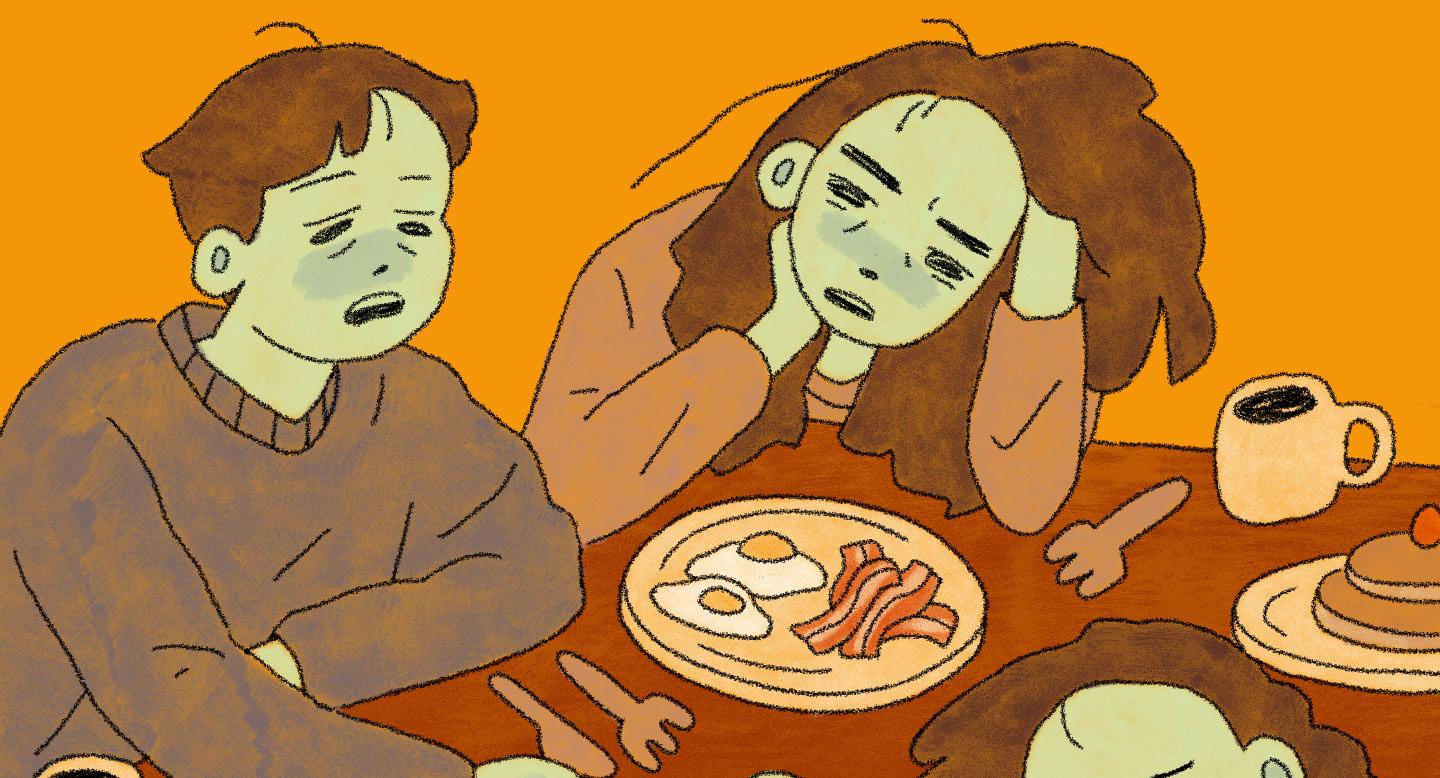
When we crowded ‘round to watch
A girl with an ironic suit and flamed hair
Cleaves the cork off a champagne bottle
The two-handed effort of the sabres thrust
Turned the semi-detached into a Coliseum
A group of once-highschool losers, Finally risen to glory
Tonight, the lion is inside us all
The cause of death
Was a long playdoughed goodbye
When the beasts came out of their Caved walk-ups to tell us to shut up already.
A collective ache is already forming for the morning
Aas the night becomes a myth.
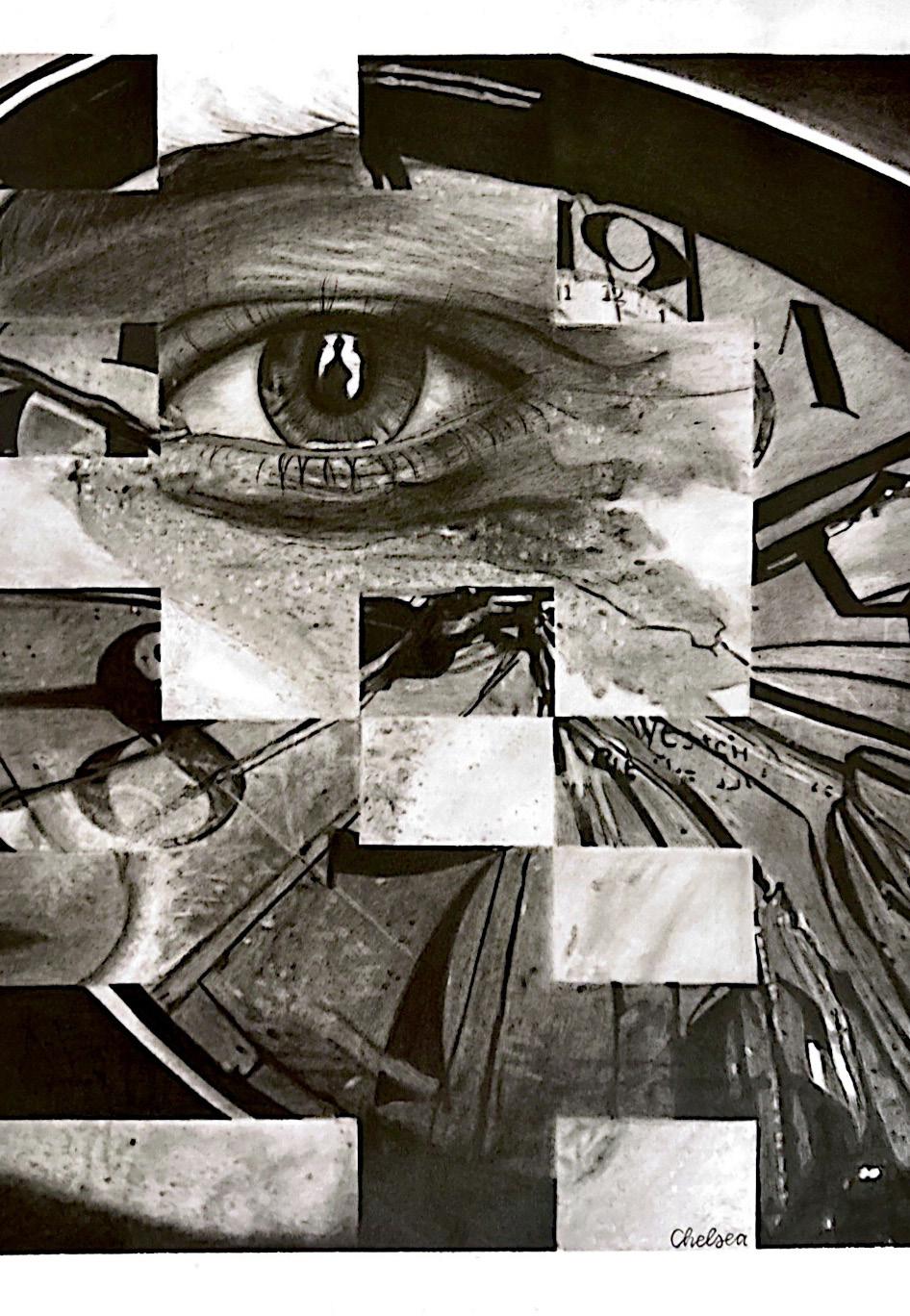
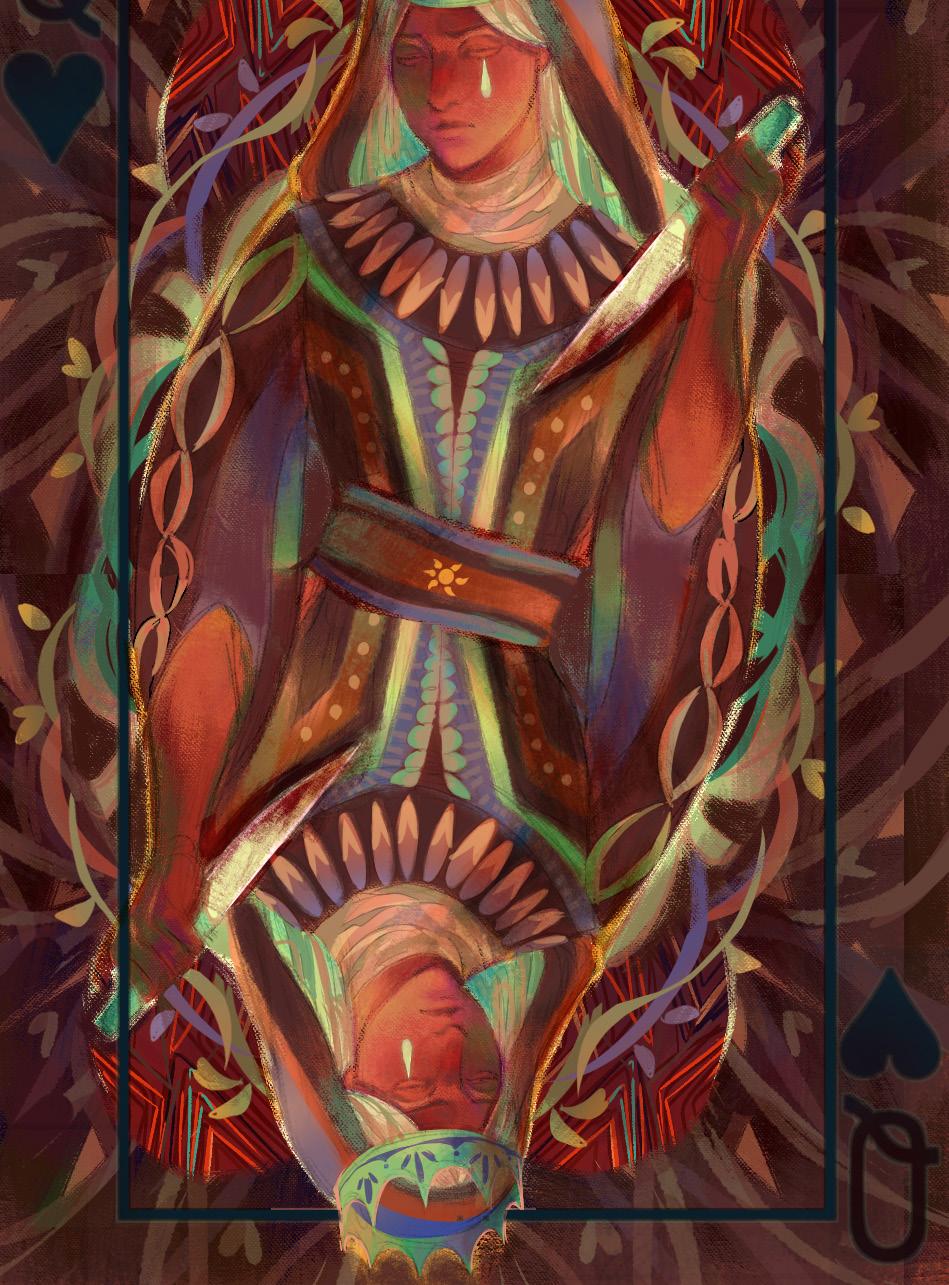

“If we are victorious in one more battle with the Romans, we shall be utterly ruined.”
–Plutarchi love like a broken thermostat. like it has no repercussions, like we have gas to last a lifetime and the winter is invincible.
i promise you i am as warm-blooded as they come.
give me your dirty laundry and i will scrub until i scrub the calluses off of my fingers, air it on the highest wire rack like it is birthday party bunting and dance under its dampness like it’s the first rain of an unquenchable summer.
i am so fucking thirsty i gulp tea right off the kettle, heave as i choke on its sweet warmth and chew the bitter leaves till all that’s left is gum. i feel sick to my core—
a saccharine toothache that refuses to dull. maybe all the apple seeds I’ve been swallowing will finally bloom.
i swear i am incorrigible, willfully reckless like worn-out sticky notes that were too flimsy to begin with.
i spin and spin until I am green, a slot machine sycophant, sick off of hope. i am the queen of hearts and i never ever fold.

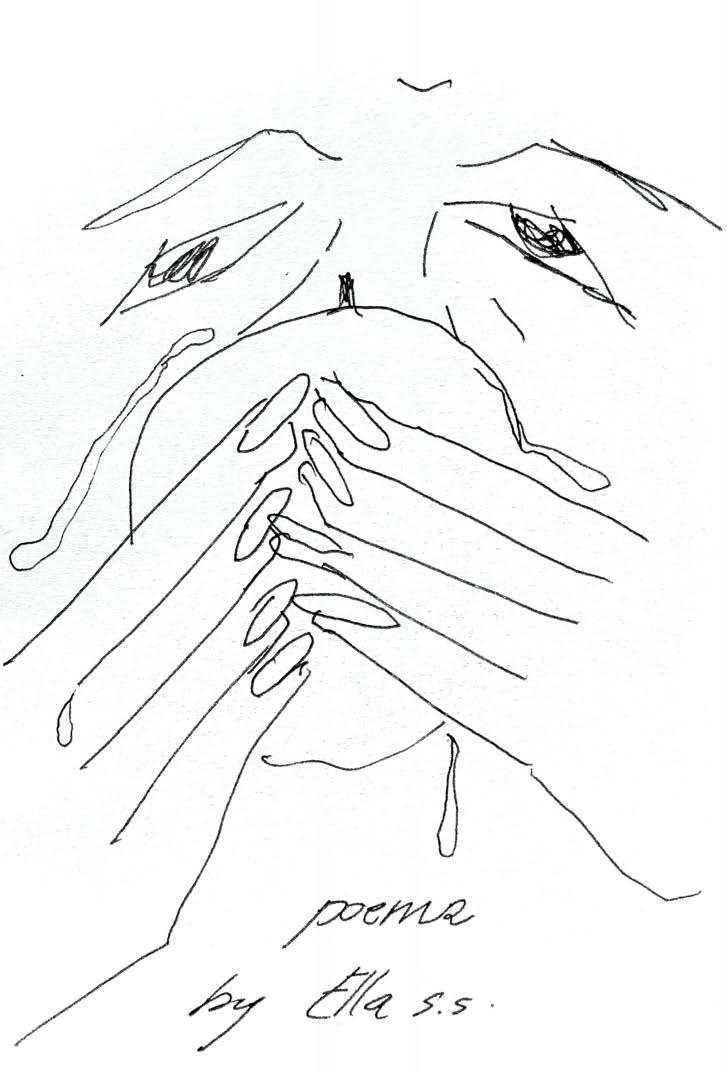
The skin of a peach is so soft, too soft softer than mine, softer than the hair that grows behind a cat’s ear— Humanise the flesh of a fruit recognise it as something equally as living as moving as my legs—your arms. Its blood runs in every direction when skin is broken and it reminds me of an ant hill flooded with water, ants running in every direction in search of safety which was just removed as they drip from my chin—dropping from the face of the earth. The liminal difference between raw steak and the fruit of a tree is all too clear in my mind, suddenly I can feel the hardness of its rib cage and feel the beat of its heart. Flesh, meat, and bone all into one. Yet it’s so sweet, it’s so very sweet, and now the thought of meat turns sour in my mouth. How can two sit so far apart on the tree of evolution yet so closely on my tongue? Now it’s all too much, now the saliva pools and my gums feel rough. The pit of the peach is covered in pungent red left from the flesh ripped by my teeth and it’s as though I am staring at the core of the earth, and it challenges all my beliefs and understandings of what life is and what lives under the skin. Everything left unseen and unrecognised feels completely exposed and I need so badly to understand what exists beyond the seeming end, the seeming bones of my living peach *crack* in the core and within its core a seed of poison stares me down. (sweet appearances) conceal (bitter reality) (uncomfortable exposures).
all into one
It was all so perfect once, I can barely remember it now.
Apparently it makes me stronger, “Disaster grows character” But the only thing I see sprouting are weeds. And not even the pretty ones—no dandelions, Just regular old grass.
It’s all so gut-punching and earth-shattering, But for character?
If that’s all I wanted, I would have done something simpler. Having my entire world crumble around me is for more than just character.
It’s for my suffering, My grief, and my pain. My river of tears and my razor-shaped scars. My broken heart and my bruised arms. My permanent frown, seared into my face, and my burnt fingertips.
Now I spend my time feeling sorry for myself, thinking the world has suddenly gone ablaze because of that grief.
What I didn’t realize is that the world has spent years sweeping up ashes And my sadness was the last flake of soot.

I lay dormant enclosed by your four walls the overhead lights hug me as luminescence wraps me in blue I fall into you fully clothed
I allow myself to sink into the waves of the sheets that surround as you manage to stay afloat my head bobs for air
the waves you provided once scared me they roared in my ear they crashed against my body but they caressed me tenderly afterwards
words by Sydney PachecoI’ve grown accustomed to their inconsistencies
as all the motion blends into one strong feeling
you start to push me below the water and I don’t fight you
It’s frigid and yet, I’m overwhelmed with warmth

you continue to drown me & I choke you laugh & I cry but we enjoy it Together
llustration by Natalie SongFor the children of Iran.
For the children of Iran.
I wrote this poem after I saw a baby in a demonstration in Toronto while protesting the murder of Jîna Mahsa Aminî . The protest was very difficult emotionally; everyone was crying, screaming, grieving in unison. I got completely distracted by the baby and momentarily forgot about the atrocious circumstances that brought me and the people around me here. I thought about how this baby was the future of Iran. It was a brief, beautiful moment.
I wrote this poem after I saw a baby in a demonstration in Toronto while protesting the murder of Jîna Mahsa Aminî . The protest was very difficult emotionally; everyone was crying, screaming, grieving in unison. I got completely distracted by the baby and momentarily forgot about the atrocious circumstances that brought me and the people around me here. I thought about how this baby was the future of Iran. It was a brief, beautiful moment.
Around me: splintering ache running from forearms into teeth. Vocal cords burnt dry from screaming outcry. Flags burning, sirens, someone asks, "Is anyone here a doctor?"


Around me: fifty thousand lungs brimming with fury, convulsing into madness, shaking like a single beast, All this, all this, and I can't help staring at this baby. There's this baby
in a pram in front of me, cooing, batting her lashes, the two of us locked in a unblinking trance, she doesn't know embarrassment yet. She doesn't know not to stare. "Please, we need a doctor!"
How out of place this baby is, here, new among the withered, fresh. Floating above the screams of grief, as the beast rocks senseless, back and forth, hemorrhaging loss, screaming bloody murder. As the crowd coagulates, I'm getting digested, compressed into a single mass, choking and constricted, vessels and shirt buttons popping, I gasp, but Oh!—The baby raises a finger, reaches out and touches my cheek,
An echoed hush, a large freedom flag pushes wind through my hair, and this finger breathes new into the beast again.

